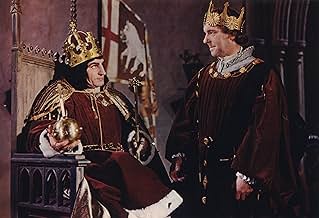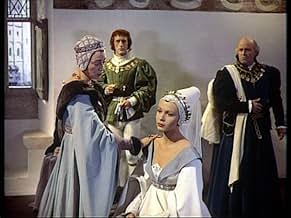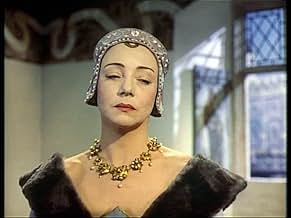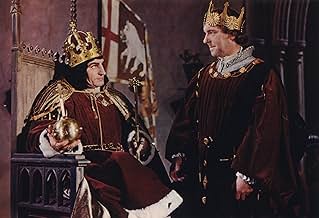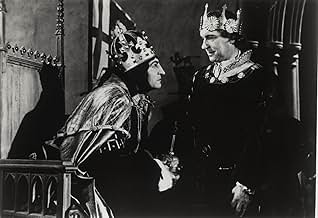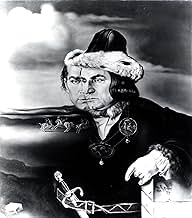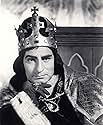CALIFICACIÓN DE IMDb
7.3/10
5.6 k
TU CALIFICACIÓN
Agrega una trama en tu idiomaA tale of the wicked deformed King and his conquests, both on the battlefield and in the boudoir.A tale of the wicked deformed King and his conquests, both on the battlefield and in the boudoir.A tale of the wicked deformed King and his conquests, both on the battlefield and in the boudoir.
- Dirección
- Guionistas
- Elenco
- Nominado a 1 premio Óscar
- 9 premios ganados y 3 nominaciones en total
Wallace Bosco
- Monk
- (as Wally Bascoe)
Opiniones destacadas
10o_levina
I just can't find words to describe how I like this film. It is the most magnificent film I've ever seen. And it is certainly the best work of Laurence Olivier. I came to learn about this film quite accidentally. I was watching on TV some program about Shakespeare's plays and their adaptations. There were a number of fragments from different films and from this one too
It was the moment where Richard is offered a crown, he refuses at first and then accepts. I was stunned when Buckingham approached Richard to congratulate and Richard suddenly made him kneel down and kiss his hand. The gesture was so majestic, imperative and full of evil triumph. I understood at once that it was a great film. I've bought VHS tape as soon as I've found it and I've already seen it about dozen times. It's superb. Everything is splendid screenplay, costumes, scenery and acting. I like John Gielgud as noble Clarence and Ralf Richardson as cunning Buckingham, and especially Claire Bloom as gentle and unhappy Lady Anne. However I still admire Laurence Olivier more than anybody else. I just can't forget his terrific voice and acting at the scene of first Richard's monologue that reveals malicious ambitious, mercilessness and devilish ingenuity of the Duke of Gloucester. Another scene I adore is his wooing Lady Anne. Both actors are great. Olivier is so convincing and moving that I believe any woman could surrender. Olivier maintains high standards of these impressive scenes through the whole film until the final battle. Richard is desperate and courageous at the end, he is killed but his spirit is not broken (he can be afraid of ghosts, not real enemies). Shakespearean play is brilliant and the film is worthy of the original. It's the most glorious historical movie of all times. I recommend everyone to see it.
This excellent production of "Richard III" features a terrific performance by Laurence Olivier in the lead role, plus a fine supporting cast, good color photography, and plenty of color and pageantry to set off the action. Richard III can be one of Shakespeare's most entertaining plays when it is done well, and this version does full justice to this classic play. It's especially enjoyable if you get the restored widescreen version.
Olivier is unsurpassed at performing Shakespeare, keeping the balance between giving life to his characters while making sure that they remain part of the play as a whole, rather than drawing all the attention to himself. This might be the best of all his screen Shakespearean roles, since Richard gives him so much to work with, and also because he has such an accomplished supporting cast to complement his own performance. Playing Richard gives him a chance to be charming, devious, tyrannical, and more, and the role offers some choice solo speeches plus other scenes that have excellent give-and-take with the other characters.
The rest of the cast also deserves praise. Ralph Richardson is ideally cast as Buckingham, a character who is so important both to the plot and also to showing us what Richard himself is all about. The rest of the cast includes good performances from Cedric Hardwicke, John Gielgud, Claire Bloom, and others. Olivier's adaptation/revision of the script also works pretty well, maintaining the feel of the play while often highlighting scenes that make for particularly good cinema. It all makes this just what a movie version of Shakespeare should be.
Olivier is unsurpassed at performing Shakespeare, keeping the balance between giving life to his characters while making sure that they remain part of the play as a whole, rather than drawing all the attention to himself. This might be the best of all his screen Shakespearean roles, since Richard gives him so much to work with, and also because he has such an accomplished supporting cast to complement his own performance. Playing Richard gives him a chance to be charming, devious, tyrannical, and more, and the role offers some choice solo speeches plus other scenes that have excellent give-and-take with the other characters.
The rest of the cast also deserves praise. Ralph Richardson is ideally cast as Buckingham, a character who is so important both to the plot and also to showing us what Richard himself is all about. The rest of the cast includes good performances from Cedric Hardwicke, John Gielgud, Claire Bloom, and others. Olivier's adaptation/revision of the script also works pretty well, maintaining the feel of the play while often highlighting scenes that make for particularly good cinema. It all makes this just what a movie version of Shakespeare should be.
In many ways this is a stage-bound adaptation and with Olivier in the lead role this is not a bad thing. After all he was one of the theatre greats of the twentieth century.
In Richard III, Olivier constantly turns and talks to the audience with his devilish plans to ascend to the throne of England. Aided by his cousin the Duke of Buckingham (Ralph Richardson) he soon replaces King Edward IV (Cedric Hardwicke), rids himself of his other brother George (John Gielgud) and dispatches his young nephews to the tower and then brings their tender lives to a premature end.
The deformed, despicable hunchback even seduces the widow of a man he murdered for his own purposes, Lady Anne (Claire Bloom).
Once Richard ascends to the throne he finds that he has to do battle with a rival who also stakes a claim to the hollow crown.
This is a chance to see Olivier, still in his pomp speaking the Bard's verse. Unfortunately the accompanying music is too bombastic and Olivier's death scene verges on the ham.
In Richard III, Olivier constantly turns and talks to the audience with his devilish plans to ascend to the throne of England. Aided by his cousin the Duke of Buckingham (Ralph Richardson) he soon replaces King Edward IV (Cedric Hardwicke), rids himself of his other brother George (John Gielgud) and dispatches his young nephews to the tower and then brings their tender lives to a premature end.
The deformed, despicable hunchback even seduces the widow of a man he murdered for his own purposes, Lady Anne (Claire Bloom).
Once Richard ascends to the throne he finds that he has to do battle with a rival who also stakes a claim to the hollow crown.
This is a chance to see Olivier, still in his pomp speaking the Bard's verse. Unfortunately the accompanying music is too bombastic and Olivier's death scene verges on the ham.
It was Olivier's production of HENRY V that led to his showing what a creative producer/director of film he could be. His Oscar came from his "Freudian" interpretation of HAMLET. But I suspect that most people would say his greatest Shakespearean film (both as star and director) was this one - his performing the greatest villainous role in the English language, King RICHARD III.
One can carp about the historical accuracy of RICHARD III from now until doomsday. That monarch was attacked by two of England's leading literary figures: Sir Thomas More (who is also a political/religious martyr), and Shakespeare. In comparison only two literary figures of any consequence ever defended him: Horace Walpole (the 18th Century diarist and letter writer - best recalled, if at all, for his Gothic novel THE CASTLE OF OTRANTO) and Josephine Tey, the dramatist and mystery novelist who wrote a detective story, THE DAUGHTER OF TIME, to defend him. More, a Tudor government official (eventually Lord Chancellor, before he fell from official favor) was close to one of Richard's foes, Cardinal Morton, and so accepted Morton's stories about Richard's murderous guilt. He wrote a HISTORY OF RICHARD III. Shakespeare, to keep official favor with the court, had to placate it with it's glorification of Henry VII, and vilification of the monarch who Henry defeated and killed. Walpole, a student of 18th Century skepticism and scholarship, wrote SOME QUESTIONS REGARDING RICHARD III, which point by point debated the so-called crimes Richard committed. Walpole, however, also was convinced that the pretender, Perkins Warbeck (executed 1499) was actually the younger one of the two Princes in the Tower. Tey used her gifts as a mystery novelist to examine the case as an intellectual puzzle for a recuperating Inspector Adam Grant in the novel. But she is basing her views on work done up to about 1935 or so, especially the Life of Richard III by the exploration historian Sir Clement Markhams. Today we realize more information from contemporary documents have come out. The balanced view is that Richard is truly a usurper (but this was par for the political course of 1483, especially after all of the blood and plotting of the War of the Roses). However, his actual planning of the deaths of Henry VI and his son, of George, Duke of Clarence, of Lords Rivers, Grey, and Hastings, and of his two nephews has never been conclusively shown (it could have been his one time ally the Duke of Buckingham, or his enemy Henry, Earl of Richmond/Henry VII, or even Cardinal Morton!).
But without a dramatist or novelist of Shakespeare's stature, we are left with only Shakespeare's Richard - the finest example of a Machiavellian monarch on stage. So it is that the role can never be played poorly, unless by some stupid concept thrown in by a director (witness Richard Dreyfus's having to play Richard as an over-the-top homosexual in THE GOODBYE GIRLS due to Paul Benedict's idiot scheme of production). An example of the universality of the role was shown by Sir Ian McKellan's version a decade ago, set in the 1930s, suggesting Richard as a potential Fascist leader of Great Britain (complete with his "Hog" symbol used in place of a swastika). That film version too was wonderful.
Olivier is ably assisted by his cast of Richardson, Guilgud, Baker, Hardwicke, Bloom, and the others who show what happens when a power-hungry monster is allowed to divide and conquer his opponents, and then seize total power. There are moments in the film where Olivier's real personality comes out in frightening intensity. One is where he is playing with the two nephews, and when one teasingly refers to his humpback, the camera and lighting shows an intense hatred and anger rising from his eyes (the boys, by the way, notice it and cower). The other is the point when Richard decides to rein in his erstwhile ally in his rise, Buckingham (Richardson) who is at court to present his request for some payment for his assistance. Richard shouts impatiently "I'm not in the giving mood today!", and crashes his scepter down narrowly missing Buckingham's hand. The Duke notices this, and soon is off on his ill-fated rebellion.
RICHARD III was a first rate film - in my opinion it may be the best filmed version of a Shakespeare play made before 1980. It is regrettable that,whatever the reason, Olivier never directed another Shakespearean film (he planned at least one I would have been interested in - CORIOLANUS - which never got beyond the stage production). So enjoy the three we have, and his performances in the films OTHELLO and AS YOU LIKE IT, and the television versions of his THE MERCHANT OF VENICE and KING LEAR. It's all we'll ever have.
One can carp about the historical accuracy of RICHARD III from now until doomsday. That monarch was attacked by two of England's leading literary figures: Sir Thomas More (who is also a political/religious martyr), and Shakespeare. In comparison only two literary figures of any consequence ever defended him: Horace Walpole (the 18th Century diarist and letter writer - best recalled, if at all, for his Gothic novel THE CASTLE OF OTRANTO) and Josephine Tey, the dramatist and mystery novelist who wrote a detective story, THE DAUGHTER OF TIME, to defend him. More, a Tudor government official (eventually Lord Chancellor, before he fell from official favor) was close to one of Richard's foes, Cardinal Morton, and so accepted Morton's stories about Richard's murderous guilt. He wrote a HISTORY OF RICHARD III. Shakespeare, to keep official favor with the court, had to placate it with it's glorification of Henry VII, and vilification of the monarch who Henry defeated and killed. Walpole, a student of 18th Century skepticism and scholarship, wrote SOME QUESTIONS REGARDING RICHARD III, which point by point debated the so-called crimes Richard committed. Walpole, however, also was convinced that the pretender, Perkins Warbeck (executed 1499) was actually the younger one of the two Princes in the Tower. Tey used her gifts as a mystery novelist to examine the case as an intellectual puzzle for a recuperating Inspector Adam Grant in the novel. But she is basing her views on work done up to about 1935 or so, especially the Life of Richard III by the exploration historian Sir Clement Markhams. Today we realize more information from contemporary documents have come out. The balanced view is that Richard is truly a usurper (but this was par for the political course of 1483, especially after all of the blood and plotting of the War of the Roses). However, his actual planning of the deaths of Henry VI and his son, of George, Duke of Clarence, of Lords Rivers, Grey, and Hastings, and of his two nephews has never been conclusively shown (it could have been his one time ally the Duke of Buckingham, or his enemy Henry, Earl of Richmond/Henry VII, or even Cardinal Morton!).
But without a dramatist or novelist of Shakespeare's stature, we are left with only Shakespeare's Richard - the finest example of a Machiavellian monarch on stage. So it is that the role can never be played poorly, unless by some stupid concept thrown in by a director (witness Richard Dreyfus's having to play Richard as an over-the-top homosexual in THE GOODBYE GIRLS due to Paul Benedict's idiot scheme of production). An example of the universality of the role was shown by Sir Ian McKellan's version a decade ago, set in the 1930s, suggesting Richard as a potential Fascist leader of Great Britain (complete with his "Hog" symbol used in place of a swastika). That film version too was wonderful.
Olivier is ably assisted by his cast of Richardson, Guilgud, Baker, Hardwicke, Bloom, and the others who show what happens when a power-hungry monster is allowed to divide and conquer his opponents, and then seize total power. There are moments in the film where Olivier's real personality comes out in frightening intensity. One is where he is playing with the two nephews, and when one teasingly refers to his humpback, the camera and lighting shows an intense hatred and anger rising from his eyes (the boys, by the way, notice it and cower). The other is the point when Richard decides to rein in his erstwhile ally in his rise, Buckingham (Richardson) who is at court to present his request for some payment for his assistance. Richard shouts impatiently "I'm not in the giving mood today!", and crashes his scepter down narrowly missing Buckingham's hand. The Duke notices this, and soon is off on his ill-fated rebellion.
RICHARD III was a first rate film - in my opinion it may be the best filmed version of a Shakespeare play made before 1980. It is regrettable that,whatever the reason, Olivier never directed another Shakespearean film (he planned at least one I would have been interested in - CORIOLANUS - which never got beyond the stage production). So enjoy the three we have, and his performances in the films OTHELLO and AS YOU LIKE IT, and the television versions of his THE MERCHANT OF VENICE and KING LEAR. It's all we'll ever have.
That "Richard III" is one of the all-time great acting performances is hard to argue with. In the title role, Sir Laurence Olivier manages to be rousing and hate-inducing, menacing and amusing, often all at once. He was the world's greatest stage actor of his time, and Shakespeare was the world's greatest stage writer. So how do they do on the movie screen?
Quite well. Because "Richard III," like "Patton" or "Scarface," is essentially a one-man show, and Olivier was the best Shakespearean actor of his time or since, we are in good hands. As a director (and uncredited co-writer), Olivier telescopes the action on screen in such a way as to negate the necessary stageiness of Shakespeare's text. He moves us the audience from one scene to another by pulling back a curtain and nodding to us to come closer, as if we were an old friend. He yells some lines, then coos others, his vocal dynamics challenging even seasoned readers of the play in terms of what he chooses to accent and what he does not. Finally, he finds the ample stores of humor Shakespeare gave this, one of his darker plays.
"A sweeter and a lovelier gentleman...the spacious world cannot again afford," Richard says of one man he killed, and Olivier invests moments like this with a firm tongue in cheek. While wooing that man's wife (strictly for political gain), he actually draws a sword when presenting himself as the widow's new suitor, telling her to plunge it into him if she won't be his bride. She tells him he's a liar. "Then never man was true!" Richard shouts, and Olivier as he says this rolls his eyes shamelessly, like a silent-screen matinée idol. I can't watch that scene without laughing; it's a Mel Brooks moment.
The film does move slowly, despite Olivier's trims. Entire scenes get cut out, yet the first act is drawn on for nearly an hour with the help of some dialogue brought in from another Shakespeare play. Surely Olivier could have set more up as part of the opening text narrative, and gotten down to business with that famous opening soliloquy.
A worse fault is the woodenness of some of the actors, like the ones who play Catesby, Brackenbury, and especially Lord Hastings. It doesn't help that they don't get the same chance to address the viewer that Olivier avails himself. Sir John Gielgud even seems lost playing a naive victim of Richard's complots. Seen to better advantage are Claire Bloom as the woman Richard woos, Michael Gough as a murderer, and Patrick Troughton as the nasty child-killing nobleman Tyrell.
Ralph Richardson gives the second-best performance in the play as the Duke of Buckingham, a half-step behind Richard in guile and cruelty, but trying to catch up in his own cold-blooded way. It's funny to read here that Olivier wanted Orson Welles in the role. Welles would have seemed too crafty. Richardson makes a believable victim as well as conspirator. Also, you have to mention Pamela Brown's Mistress Shore, who has no lines (because Shakespeare wrote none for her) but manages in Olivier's direction to play a central role by currying the bedside favor of King Edward and of Hastings.
But Olivier of course is the only reason this movie is still watched. And he's worth watching as long as movies are seen. Yes, he may have won World War II making his movie version of "Henry V," and his "Hamlet" was when he became Hollywood's favorite emissary of high culture, but "Richard III" is still the thing to catch the conscienceless of the king, his moment of highest dungeon and merriest perversity. It's movies like this one that remind us why acting can be a noble profession, even for those who aren't knighted for their excellence in it.
Quite well. Because "Richard III," like "Patton" or "Scarface," is essentially a one-man show, and Olivier was the best Shakespearean actor of his time or since, we are in good hands. As a director (and uncredited co-writer), Olivier telescopes the action on screen in such a way as to negate the necessary stageiness of Shakespeare's text. He moves us the audience from one scene to another by pulling back a curtain and nodding to us to come closer, as if we were an old friend. He yells some lines, then coos others, his vocal dynamics challenging even seasoned readers of the play in terms of what he chooses to accent and what he does not. Finally, he finds the ample stores of humor Shakespeare gave this, one of his darker plays.
"A sweeter and a lovelier gentleman...the spacious world cannot again afford," Richard says of one man he killed, and Olivier invests moments like this with a firm tongue in cheek. While wooing that man's wife (strictly for political gain), he actually draws a sword when presenting himself as the widow's new suitor, telling her to plunge it into him if she won't be his bride. She tells him he's a liar. "Then never man was true!" Richard shouts, and Olivier as he says this rolls his eyes shamelessly, like a silent-screen matinée idol. I can't watch that scene without laughing; it's a Mel Brooks moment.
The film does move slowly, despite Olivier's trims. Entire scenes get cut out, yet the first act is drawn on for nearly an hour with the help of some dialogue brought in from another Shakespeare play. Surely Olivier could have set more up as part of the opening text narrative, and gotten down to business with that famous opening soliloquy.
A worse fault is the woodenness of some of the actors, like the ones who play Catesby, Brackenbury, and especially Lord Hastings. It doesn't help that they don't get the same chance to address the viewer that Olivier avails himself. Sir John Gielgud even seems lost playing a naive victim of Richard's complots. Seen to better advantage are Claire Bloom as the woman Richard woos, Michael Gough as a murderer, and Patrick Troughton as the nasty child-killing nobleman Tyrell.
Ralph Richardson gives the second-best performance in the play as the Duke of Buckingham, a half-step behind Richard in guile and cruelty, but trying to catch up in his own cold-blooded way. It's funny to read here that Olivier wanted Orson Welles in the role. Welles would have seemed too crafty. Richardson makes a believable victim as well as conspirator. Also, you have to mention Pamela Brown's Mistress Shore, who has no lines (because Shakespeare wrote none for her) but manages in Olivier's direction to play a central role by currying the bedside favor of King Edward and of Hastings.
But Olivier of course is the only reason this movie is still watched. And he's worth watching as long as movies are seen. Yes, he may have won World War II making his movie version of "Henry V," and his "Hamlet" was when he became Hollywood's favorite emissary of high culture, but "Richard III" is still the thing to catch the conscienceless of the king, his moment of highest dungeon and merriest perversity. It's movies like this one that remind us why acting can be a noble profession, even for those who aren't knighted for their excellence in it.
¿Sabías que…?
- TriviaMichael Gough got his part (Dighton, the first murderer) by making a fuss to his fellow actor friends about only established stars getting cameo parts and leaving nothing for struggling actors like him. One night he got a phone call, and a voice said "You've been stirring it, haven't you? Right little shit." Gough demanded to know, "Who is this?" only to be stunned by the response, "It's Larry", which of course was Sir Laurence Olivier. Olivier was just having some fun at Gough's expense, had taken on-board his criticisms and was ringing to offer him the part of one of the murderers in this movie. When asked which one he wanted to play, Gough quickly said "Whichever one has the most lines", and he got his wish. Olivier arranged matters so that Gough's scenes were split over several days, instead of all being done in one day, so that Gough would maximize his per diem fee.
- ErroresIn the scene when Richard tells King Edward of Clarence's supposed treason, two monks are singing hymns from a large book: their lips are not only out of sync with their singing, but with each other.
- Citas
Richard III: I'll drown more sailors than the mermaid shall,/ I'll play the orator as well as Nestor,/ Deceive more slyly than Ulysses could,/ And, like a Sinon, take another Troy./ I can add colours to the chameleon, /Change shapes with Proteus for advantages, /And set the murderous Machiavel to school./ Can I do this,and cannot get a crown?/Tut, were it farther off,/ I'll pluck it down.
- Créditos curiososMost of the film's credits are shown at the end. The opening credits show only the title of the film, William Shakespeare's name, and the names of the main actors.
- Versiones alternativasReleased in Great Britain at 155 minutes; some of the prints released in the USA are 139 minutes.
- ConexionesFeatured in Great Acting: Laurence Olivier (1966)
Selecciones populares
Inicia sesión para calificar y agrega a la lista de videos para obtener recomendaciones personalizadas
Detalles
- Tiempo de ejecución
- 2h 41min(161 min)
- Color
Contribuir a esta página
Sugiere una edición o agrega el contenido que falta


